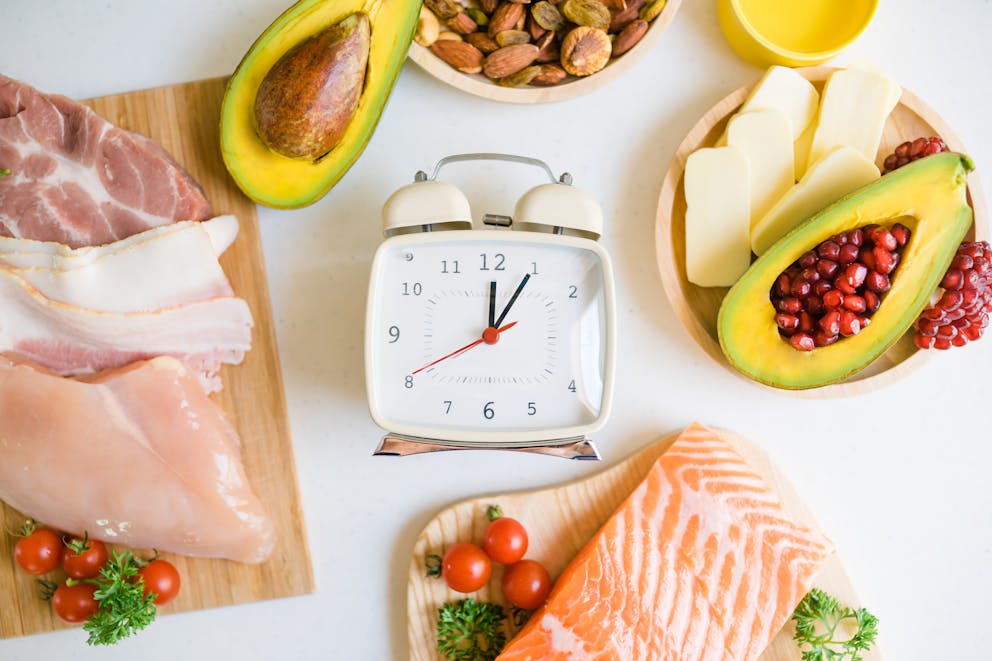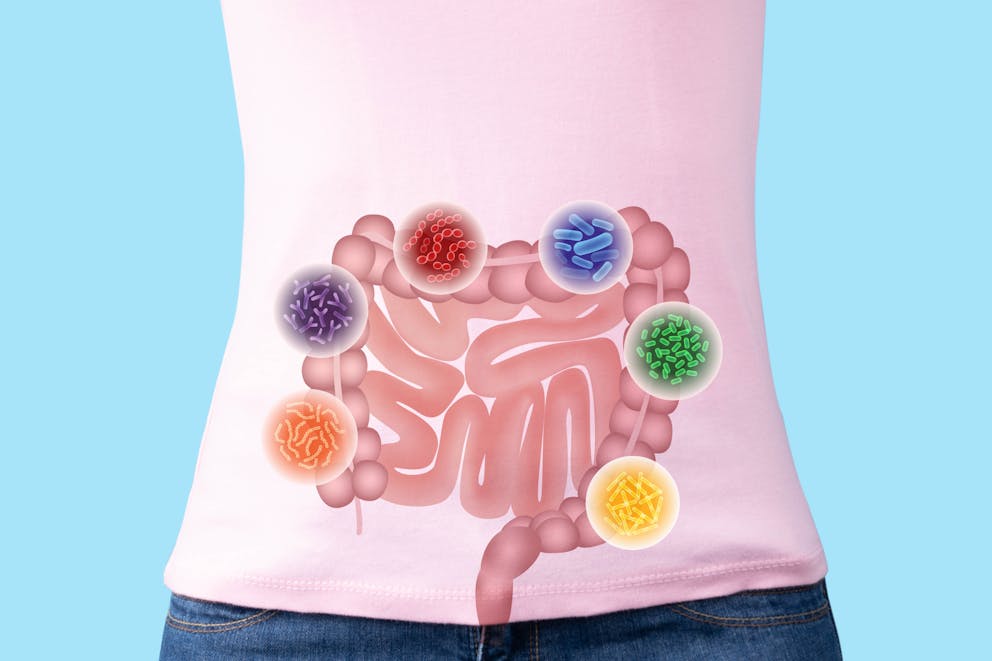The 7th Reason Why You Can't Lose Weight
Have you suddenly hit a weight loss plateau despite maintaining your low-carb lifestyle and calorie deficit? Learn about the potential causes of a weight loss plateau on keto and explore strategies to boost fat burning.
Reasons for Weight Loss Plateau
Encountering a weight loss plateau on the ketogenic diet may result from metabolic adjustments and initial water weight loss. To overcome this plateau, consider recalibrating caloric intake and macronutrient distribution, along with exploring intermittent fasting.
Let's examine some 7 common plateau causes and potential solutions you could adopt to overcome this hurdle on your journey for health and well-being.
Reducing Carb Intake to Maintain Ketosis
Consuming too many carbs can knock you out of ketosis, stalling your weight loss efforts.
To stay in ketosis, don’t exceed 20 to 50g net of carbs daily (total carbs minus dietary fiber).

Frequent Snacking
When people snack often, they make it harder for their bodies to stay in fat-burning mode. Many times, regular snacking can lead to weight loss plateaus.
Intermittent fasting (IF) is a powerful tool in breaking through plateaus when combined with the keto diet.
A 16:8 or 18:6 intermittent fasting schedule helps your body to become fat-adapted, which promotes weight loss and has several other health benefits, including improved energy levels, better sleep, and enhanced mental focus.
Managing Stress Effectively With Relaxation Exercises
Your mental health plays an essential role in weight management, and high-stress levels can lead to cortisol spikes that hinder fat-burning processes.
Relaxation exercises like deep breathing, walking in nature, or gardening can help keep stress in check.
Prioritizing Good Sleep Hygiene Habits
Improving your sleep hygiene habits, such as establishing a regular bedtime routine and creating an optimal sleeping environment, can significantly impact weight loss success.
Lack of adequate sleep can imbalance metabolic and digestive hormones, promoting hunger and cravings while blocking fat burning.
Incorporating Regular Physical Activity Into Daily Routines
Exercise is crucial for overall health and weight management. It burns calories and helps maintain muscle mass while losing fat on keto.
Adjusting Macronutrient Ratios In The Diet
If you struggle to lose weight on keto, you may need to look closer at your macronutrient ratios (fat, protein, carbs).
If you're consuming too many carbs, it might be time to tweak those numbers to ensure you get the right balance for optimal weight loss results.
Focus on getting most of your calories from healthy fats such as avocado, coconut oil, olive oil, fatty fish, seeds, and nuts.
The 7th Reason - Damaged Microbiome
Now that we have discussed 6 common plateau causes and their solutions, let's talk about a lesser-known factor that could be stalling your weight loss progress.
Dysbiosis, or the lack of friendly gut bacteria, can significantly impact your body’s ability to lose weight.

Role of Probiotics in Promoting Weight Loss
Friendly gut bacteria are essential for maintaining a healthy metabolism. Studies have shown that individuals with healthier gut microbiomes tend to lose more weight than those lacking beneficial microbes.
Introducing pre and probiotic foods into our diet can help improve insulin sensitivity and normalize blood glucose levels - thus positively impacting insulin resistance and LDL cholesterol levels.
Impact on Insulin Resistance and LDL Cholesterol Levels
A balanced gut microbiome can benefit metabolic health and lower insulin resistance risk and bad cholesterol (LDL).
Exploring ways to cultivate a balanced gut microbiome complements weight loss efforts, offering additional benefits such as improved metabolic health and reduced risks of insulin resistance and elevated LDL cholesterol.
Strengthening Your Gut Health Through Prebiotic Foods
Consuming prebiotic foods is crucial to give your friendly bacteria the nourishment they need. These fiber-rich, non-starchy vegetables provide the perfect environment for your gut buddies to thrive and help you break through that weight loss plateau.
Improving Your Gut Microbiome for Weight Loss Success
Now that we've established the importance of a healthy gut microbiome, let's discuss how to fortify it with probiotics and prebiotics.
Choosing High-Quality Probiotic Supplements
Picking the right probiotic supplement is essential - look for one with multiple strains of bacteria and at least 10 billion CFUs (colony-forming units).
You can opt for a liquid probiotic supplement if you struggle to swallow large capsules.
Incorporating Fiber-Rich Vegetables into Meals
Unlike their bacterial counterparts, prebiotics are non-digestible fibers found in certain foods that act as food for beneficial bacteria.
Eat fiber-rich vegetables like artichokes, asparagus, and onions to provide plenty of fuel for beneficial bacteria.
Avoid processed foods, which can harm the delicate balance of your gut microbiome. Stick to whole, natural ingredients whenever possible. Processed foods can negatively impact our gut microbiomes by promoting harmful bacterial growth, increasing your risk of dysbiosis and associated adverse health effects.
Weight Loss and Metabolic Body Types
If you've been following a low-carb ketogenic diet for weight loss, you may have experienced a plateau in your progress.
This can be frustrating, but it's essential to understand that everyone's body is different and responds differently to various diets.
Metabolic Body Types
Three primary metabolic body types are ectomorphs, mesomorphs, and endomorphs.
Understanding which type you are can help guide your weight loss journey.
Ectomorph: Ectomorphs tend to be naturally thin with a fast metabolism. They have difficulty gaining muscle mass but also struggle with adding body fat.
Mesomorph: Mesomorphs have an athletic build with broad shoulders and narrow waists. They typically gain muscle quickly but gain fat more efficiently than ectomorphic individuals.
Endomorph: Endomorphic individuals carry more body fat than the other two types due to slower metabolisms. They may find it difficult to lose weight without strict calorie control and exercise regimens.
If you want to learn more about your body type, take this weight loss body type quiz.
Conclusion
Hitting a weight loss plateau is common when following the ketogenic diet.
To overcome this challenge, reduce carb intake, use intermittent fasting methods, manage stress with relaxation exercises, prioritize good sleep hygiene habits, and incorporate physical activity into your daily routine.
FAQs
1. How Long Does a Weight Loss Plateau Last on Keto?
A weight loss plateau on keto can last a few days to several weeks. This duration varies depending on individual factors such as metabolic rate, activity level, and adherence to the diet.
Adjusting your macronutrient ratios, incorporating intermittent fasting techniques, or increasing physical activity can help overcome this stall.
2. How Do You Break a Keto Plateau?
To break a keto plateau, try implementing these strategies:
Adjusting macronutrient ratios
Incorporating intermittent fasting
Increasing physical activity
Prioritizing sleep hygiene habits
Managing stress effectively with relaxation exercises
3. Why Am I Sticking to Keto But Not Losing Weight?
If you're adhering to the ketogenic diet but not losing weight, it could be due to various reasons, such as consuming hidden carbs in processed foods or overeating calorie-dense items like nuts and dairy products.
Additionally, inadequate sleep and high-stress levels may also hinder progress.
4. How Do You Break a Plateau in Weight Loss?
To break through a weight loss plateau:
Evaluate current eating patterns and adjust caloric intake if needed.
Increase exercise intensity or frequency.
Add strength training to your routine.
Maintain proper hydration levels.
Supporting Data
https://www.nature.com/articles/s41598-020-60991-7
https://www.ncbi.nlm.nih.gov/pmc/articles/PMC6266556/
https://www.ncbi.nlm.nih.gov/pmc/articles/PMC6319478/
https://link.springer.com/article/10.1007/s40200-020-00506-3
Previous blog
Low Fat Diets and Sex HormonesNext blog
When Keto Doesn’t Work, This is WhyTags

Popular
08/21/2024
55.7K views
02/23/2025
46.8K views
11/18/2024
281.1K views
03/18/2024
11/21/2022




